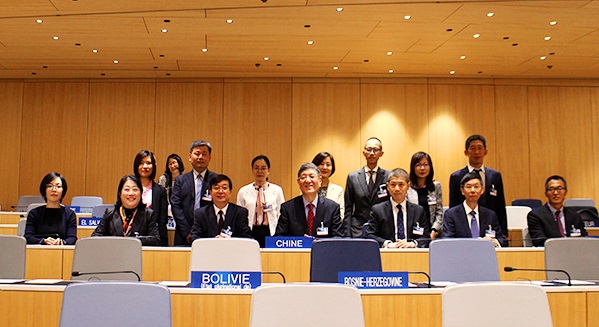
CNIPA Deputy Commissioner He Hua led a delegation of the government of the People's Republic of China to attend the meetings
On September 30 (local time), the 59th series of meetings of the Assemblies of the Member States of WIPO were opened in Geneva of Switzerland. CNIPA Deputy Commissioner He Hua led a delegation of the Government of the People's Republic of China to attend. Li Song, Ambassador Extraordinary and Plenipotentiary for Disarmament Affairs of the People's Republic of China to the United Nations Office at Geneva and Other International Organizations in Switzerland, and David Wong, Director of Intellectual Property Department of the Government of the Hong Kong Special Administrative Region, attended the meetings.
He Hua gave a speech at the opening ceremony, stating that the Chinese government attaches great importance to IPR protection and will intensify international cooperation in IPR protection, strive to create a business and innovation environment that respects the value of knowledge and comprehensively improve the legal system on IPRs. Since this year, China has issued the Foreign Investment Law, revised the Trademark Law, introduced the system of punitive damages for trademark infringement and is accelerating the amendment of the Patent Law and Copyright Law to improve IP protection level. In doing so, China is striving to improve the IP examination quality and efficiency to meet the demands of innovators and market players.
He Hua pointed that, over the past year, the cooperation between the Chinese government and WIPO has been further deepened and two batches of totally 17 TISCs have been built in China. CNIPA and WIPO jointly held the 1st trans-regional international meeting on TISCs in September this year and they are going to hold a high-end forum on copyright protection in December. CNIPA has been working hard to promote the application of the Patent Cooperation Treaty (PCT) and the Madrid and Hague systems in China to support the efficient operation of the WIPO Office in China. Besides, active progress has also been achieved in IPR alternative dispute resolution in the cooperation between China and WIPO.
He Hua highly appreciated the brilliant achievements WIPO has made under the leadership of its Director General and the senior management team, including the positive results achieved in the making of international IP rules and the outstanding achievements made in realizing WIPO's nine strategic goals and promoting the implementation of the UN's 2030 Agenda for Sustainable Development and WIPO's Development Agenda.
He Hua proposed three suggestions on relevant affairs and the agenda for the 2019 Assemblies meetings under the WIPO framework. First of all, steady progress should be ensured in WIPO's work. It was expected that the Program and Budget for the 2020/21 Biennium of WIPO could be approved at A/59 and that WIPO could continue to improve its global IP service system and incorporate Chinese and other official languages of the UN into the working languages of the Madrid and Hague systems in order to serve global innovators in a better way. Secondly, it was expected that positive progress could be achieved in the making of international IP rules under the WIPO platform. It was expected that the new mandate and work program for the Intergovernmental Committee on Intellectual Property and Genetic Resources, Traditional Knowledge and Folklore (IGC) for the 2020/2021 biennium could be approved at A/59. China supported WIPO to act as a leader in making rules in the field of emergency technologies, and it was hoped that the diplomatic conference on the Design Law Treaty could be convened as soon as possible, the WIPO Treaty on the Protection of Broadcasting Organizations could be reached as early as possible, and the Beijing Treaty on Audiovisual Performances could enter into force soon. Thirdly, full attention should be given to the concerns of developing countries. It was expected that the representativeness of developing countries in relevant decision-making bodies of WIPO could be increased and that WIPO could continue to push forward the mainstreaming of its development effort, so as to effectively help developing countries to improve their ability to use IPRs for development.
He Hua also invited David Wong to give supplementary remarks on IP work in Hong Kong.
The delegation of the Chinese government was composed of CNIPA, Ministry of Foreign Affairs, National Copyright Administration, Permanent Mission of the People's Republic of China to the United Nations Office at Geneva and Intellectual Property Department of the Government of the Hong Kong Special Administrative Region. Representatives of China Council for the Promotion of International Trade and All-China Patent Attorneys Association attended as observers. (Translated from CNIPA Website Chinese Version)